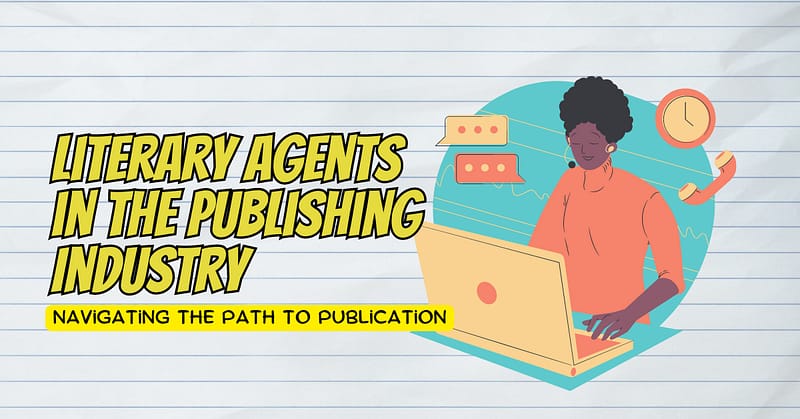Literary agents play a crucial role in the publishing industry, advocating for authors and facilitating the connection between authors and publishers. They possess industry expertise, knowledge of market trends, and established networks that can greatly enhance an author’s chances of securing a publishing deal. In this article, we will explore the significance of literary agents in the publishing industry and shed light on their role in helping authors navigate the path to publication.
Table of Contents
The Role of Literary Agents in the Publishing Industry

Advancing Author Interests
Literary agents act as representatives and advocates for authors, championing their work and advancing their interests in the publishing world. They negotiate publishing contracts, secure favorable terms and royalties, and protect authors’ rights. Agents work closely with authors to develop their careers, offering guidance and strategic advice to help them achieve their publishing goals.
Industry Expertise and Market Knowledge
Literary agents deeply understand the publishing industry, including market trends, editorial standards, and reader preferences. They stay abreast of industry developments, attend conferences and book fairs, and maintain relationships with editors and publishers. This expertise allows agents to guide authors in shaping their manuscripts, positioning their work in the market, and identifying publishing opportunities.
Manuscript Evaluation and Development
One of the key roles of a literary agent is to evaluate manuscripts and provide feedback to authors. Agents use their expertise to assess a manuscript’s quality, marketability, and potential. They offer constructive criticism, suggest revisions, and guide authors in honing their writing to meet industry standards and reader expectations. Agents also assist authors in developing book proposals and query letters to pitch their work effectively to publishers.
Submission and Publisher Connections
Literary agents have established connections with editors and publishers in the industry. They possess insider knowledge of publishing houses, imprints, and editors actively acquiring manuscripts in various genres. Agents use their network to strategically submit manuscripts to publishers that best fit the author’s work. They navigate the submission process, negotiate, and advocate for their authors during acquisitions.
Contract Negotiation and Rights Management
Negotiating publishing contracts is a vital aspect of an agent’s role. Literary agents have expertise in contract negotiations, ensuring that authors receive fair and favorable terms, including advances, royalties, and subsidiary rights. They protect authors’ intellectual property rights, such as translation rights, film and television rights, and audiobook rights. Agents also assist in securing licensing deals, subsidiary rights sales, and other opportunities to maximize an author’s income.
Finding and Working with a Literary Agent
Researching and Identifying Potential Agents
Authors seeking representation should conduct thorough research to identify literary agents specializing in their genre or subject matter. Online resources, such as literary agency websites, industry publications, and writer communities, provide valuable information on reputable agents and their submission guidelines. Authors should review agent profiles, client lists, and recent sales to find the best fit for their work.
Querying and Submitting to Literary Agents
Once authors have identified potential agents, they should follow the submission guidelines provided by each agency. Most agents require a query letter, a concise pitch highlighting the book’s unique selling points, an author bio, and a brief synopsis. Some agents may request additional materials, such as sample chapters or a full manuscript. Authors should personalize their queries and demonstrate familiarity with the agent’s preferences and client list.
Building a Positive Author-Agent Relationship
If a literary agent expresses interest in representing an author, it is important to establish a positive and professional working relationship. Authors and agents should communicate openly and honestly, aligning their expectations and goals. Trust and mutual respect are essential for a successful collaboration. Authors should be responsive, receptive to feedback, and proactive in addressing concerns raised by their agents.
Understanding the Agent-Author Agreement
When an author and agent decide to work together, they enter into a formal agreement known as the agent-author agreement. This contract outlines the terms of representation, including the agent’s commission (typically a percentage of the author’s earnings), the duration of the agreement, and the scope of the agent’s responsibilities. Authors should carefully review the contract, seek legal advice, and understand the terms before signing.
Pursuing Other Publishing Avenues
While literary agents are instrumental in securing traditional publishing deals, authors should know that they are not the only path to publication. Some authors pursue self-publishing or hybrid publishing models that do not require agent representation. Authors must explore all available options, consider their goals, and make an informed decision aligning with their publishing aspirations.
Frequently Asked Questions (FAQs)
Do I need a literary agent to get published?
No, a literary agent is not a mandatory requirement for getting published. While many traditional publishing houses prefer submissions from literary agents, there are publishing houses and imprints that accept unsolicited submissions directly from authors. Authors can also pursue self-publishing or hybrid publishing models that do not involve agent representation. Choosing a literary agent depends on an author’s publishing goals and preferences.
How do I know if a literary agent is reputable?
Research and due diligence are essential to determine if a literary agent is reputable. Authors should verify an agent’s track record, client list, and sales history. They can consult resources such as the Association of Authors’ Representatives (AAR), industry publications, and online writer communities for information and reviews. Authors should also look for agents who are members of professional organizations and adhere to industry ethical standards.
How long does it typically take to secure representation from a literary agent?
The time it takes to secure representation from a literary agent varies greatly and can range from weeks to months or longer. Some authors may receive offers of representation relatively quickly, while others may face a more extended journey of querying multiple agents before finding the right fit. Patience, perseverance, and a well-crafted query are key during agent querying.
Can a literary agent help with self-publishing?
While literary agents primarily focus on securing traditional publishing deals, some may assist authors with self-publishing or hybrid publishing options. This can include providing guidance on self-publishing platforms, offering advice on cover design and editing services, or connecting authors with trusted professionals in the self-publishing industry. Authors should discuss their self-publishing goals with potential agents to gauge their willingness to support such endeavors.
How do literary agents get paid?
Literary agents typically earn their income through commission. When an author secures a publishing deal, the agent receives a percentage (usually 15-20%) of the author’s earnings, including advances and royalties. The agent deducts their commission from the author’s payments and provides the author with the remaining amount. The commission structure is agreed upon in the agent-author agreement.
Can an author switch literary agents?
Yes, authors can switch literary agents if they feel the need to make a change. Reasons for switching agents may include a lack of communication, differing visions, or a desire to explore new opportunities. Authors should review the terms of their agent-author agreement and consult with a literary attorney if necessary to ensure a smooth transition and address any legal considerations.
Conclusion
Literary agents serve as invaluable partners for authors navigating the path to publication. Their industry expertise, market knowledge, and professional connections greatly increase an author’s chances of securing a traditional publishing deal. By finding the right agent, authors can access opportunities, negotiate favorable contracts, and receive guidance throughout their publishing journey. Working with a literary agent opens doors to the vast and ever-evolving publishing industry, ensuring that authors’ voices and stories reach the widest possible readership.





